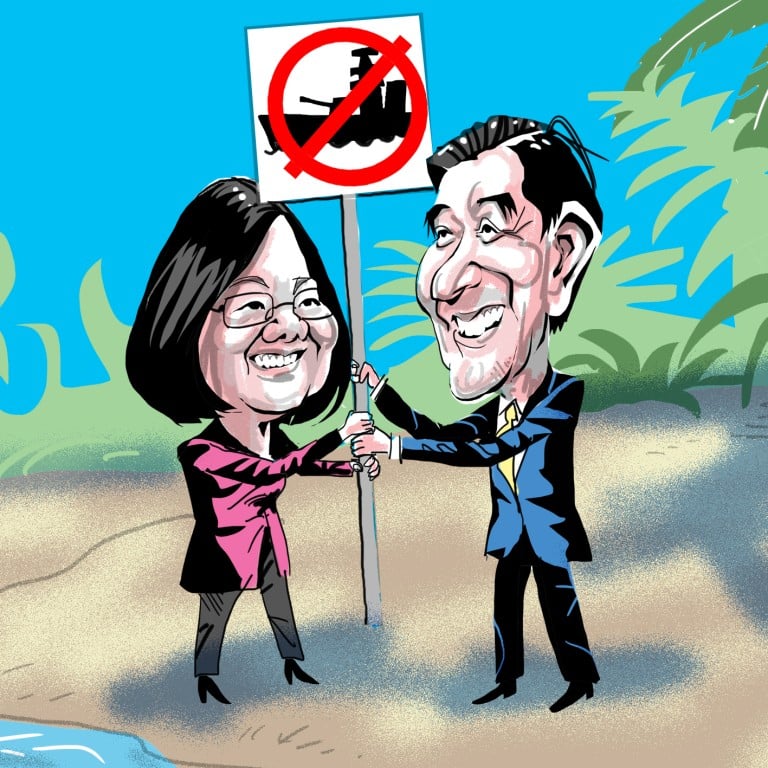
Can Taiwan show Beijing and the world how disputed islands should be used for peace?
Jerome Cohen says Taipei should turn the South China Sea island of Taiping into a centre for the peaceful resolution of East Asian disputes

READ MORE: Taiwanese president’s trip to South China Sea island unhelpful, US says
Yet the US government seemed to believe that Ma was making a monkey of its belated efforts to stop Beijing from converting five or more mere reefs or sandbars into artificial island military bases. The US expressed “disappointment” over Ma’s plan and denounced it as an action that “is extremely unhelpful and [that] does not contribute to the peaceful resolution of disputes.” This was an extraordinary public rap on Ma’s knuckles after eight years of American support for his contributions to the improvement of Taiwan-mainland relations.
What was behind this surprising turn of events will eventually be revealed. Had Ma requested US advance approval? Taiwanese and American diplomats reportedly had long been discussing the wisdom of such a trip without reaching agreement, and Ma is due to step down as president on May 20. Had Ma failed to even give the US reasonable warning of his unilateral decision? Had Washington provoked Ma’s action by not taking Taipei into its confidence regarding US Secretary of State John Kerry’s contemporaneous Beijing discussions about the South China Sea?
READ MORE: China may send anti-ship missiles to South China Sea if tensions flare with US: analysts

Taiwan has been excluded from this critical arbitration because of its diplomatic isolation and inability to take part in the UN Convention on the Law of the Sea. Nevertheless, because Taiwan continues to insist that its government is the true representative of China and maintains maritime claims similar to Beijing’s, the arbitration tribunal’s judgment will have a significant impact on Tsai’s new government, as well as on Beijing, and present Taiwan with an even more difficult dilemma than Beijing will confront.
As expected, Tsai has wisely been trying to wait until she has to face the music. She declined the opportunity to accompany Ma to Taiping island, even though the previous DPP president, Chen Shui-bian, made an unprecedented similar trip to the island years ago.
Is the US criticism of Ma a “bum rap”? My own hope has long been that he would do more than make a trip to symbolise Taiwan’s alleged sovereignty over the island and to dramatise the reasons why Taipei believes Taiping should be deemed a habitable island under the UN Law of the Sea and therefore entitled not only to a 12-mile territorial sea but also a 200-mile exclusive economic zone.
At least until that far-off moment when Taiping’s formal territorial status is resolved through diplomacy or an international law decision, Taiwan should turn the island into a centre for the peaceful resolution of East Asian disputes. It should become a site for relevant international conferences, joint research projects and continuing multilateral discussions and negotiations.

READ MORE: Obama scores victory by hosting Asean in US but breakthroughs unlikely, analysts say
There is considerable support for such an idea among Taiwan’s international law experts in and out of government. By implementing it, Taiwan would show Beijing and the world how disputed islands should be used by powers that genuinely wish to further the humanitarian purposes that Beijing sometimes offers as its motivation for building what can easily become military facilities on various maritime features. The vivid contrast between Taipei’s open, peaceful use of Taiping island, the largest natural feature among the Spratlys, and Beijing’s apparently military motives for constructing artificial islands might spur Beijing – in a face-saving effort to resolve the South China Sea crisis it has created – to take equally imaginative steps to civilianise its artificial islands, which are now larger than Taiping, and open them to regional cooperation of various kinds. Taiwan’s initiative would also help to end its diplomatic isolation and enable it to play a more dynamic role in East Asia.
The US should be encouraging Ma and his successor to move much further and in ways designed to stimulate peaceful initiatives
Instead of rapping Ma’s knuckles for moving too far, the US should be encouraging him and his successor to move much further and in ways designed to stimulate peaceful initiatives rather than mere divisive claims to national sovereignty.
Yet, what can one expect from the US? It cannot even muster the political will to persuade the Senate to consent to American ratification of the UN Convention on the Law of the Sea, which would permit the US to make full use of the options for peaceful settlement that it offers. Instead, while Barack Obama was talking the talk of international law to Asean leaders at Sunnylands, America’s conduct continues to emphasise ambiguous but dangerous military posturing in an effort to bring Beijing to the negotiating table. “Do as I say, not as I do” is not a policy for a crisis.
Jerome Cohen is a law professor at New York University, director of its US-Asia Law Institute and adjunct senior fellow at the Council on Foreign Relations

